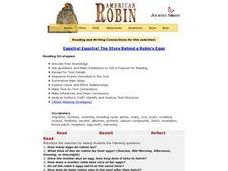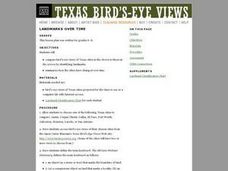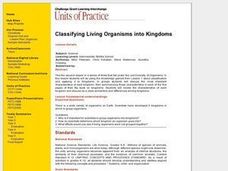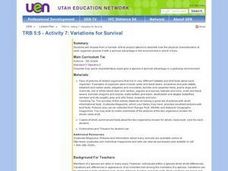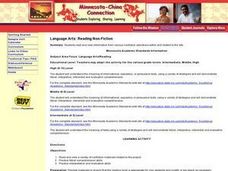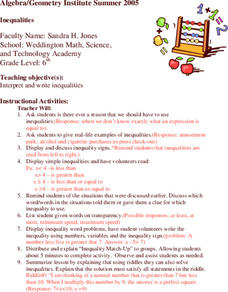Curated OER
Who Should Be Number 2?
Pupils explore role of the vice president and the qualities that a presidential candidate must look for while choosing his or her running mate.
Curated OER
Picture Graphs
First graders work with picture graphs, create their own individual graphs, and construct and read graphs.
Curated OER
Two Digit Subtraction
Second graders identify two digit numbers and work with two digit subtraction problems. They use manipulatives to demonstrate each problem.
Curated OER
Relative Weight
Second graders distinguish the difference between pounds and ounces and arrange manipulatives from heaviest to lightest.
Curated OER
Hyped Up Over North Carolina Symbols
Fourth graders obtain knowledge of North Carolina symbols and create a multimedia presentation to be presented to the class.
Curated OER
American Robin: Eggstra! Eggstra! The Story Behind a Robin's Eggs
Pupils answer questions about robin's eggs. They read about robins, then mark up text for unfamiliar words.
Curated OER
I Highly Recommend It
Sixth graders read, "The Watsons Go to Birmingham", and submit a critical review to Amazon Website online by copying and pasting their text onto the site.
Curated OER
Why a President? Why not a King?
Students research how and why a country elects to have an executive branch of the government. They study the office of the Presidency of the US.
Curated OER
Landmarks Over Time
Young scholars compare/contrast bird's-eye views of Texas cities in the 1800s to those in the 2000s through the identification of landmarks. They write a summary of how one selected city has changed over time.
Curated OER
Classifying Living Organisms into Kingdoms
Learners create a flip book that describes the basic characteristics of the five main animal kingdoms. They research the animal kingdoms, include examples of organisms for each kingdom and illustrate the finished text.
Curated OER
"Railroad Bill, A Conjure Man"
Students create questions to ask the poet, Ishmael Reed about his poetry. After the poet speaks, students are broken into groups and are to analyze a poem and report back to the class on their findings.
Curated OER
Learning From Leaves: From Observation to Inference
Young scholars examine the adaptation of plants to their environments. They analyze and observe the structure, shape, and internal structure of various leaves, and make inferences about the structures.
Curated OER
"Et tu, Brute?" - The Characters, Conflict and Historical context of Shakespeare's Julius Caesar
Students analyze the Shakespearian play, "Julius Caesar" in this seven lesson unit. Through readings, hands-on projects, and the study of plot development, comparisons are made to the movie and the historical records available.
Curated OER
Global Carbon Cycle
Pupils, in groups, create posters of the flow of a carbon atom as it travels through the carbon cycle. They make connections about how human activities affect the carbon cycle, as well.
Curated OER
Variations for Survival
Fifth graders examine two related organisms that live in different environments and compare how the physical characteristics of each organism provided it with survival advantages unique to its own environment.
Curated OER
Language Arts: Reading Non-Fiction
Students read and view information sent from seven high school students who travel to China. The daily reports that they send back to the weblog section of the site should be of high interest to students in Minnesota.
Curated OER
The IMF, Money, International Trade and Cooperation
Young scholars study the role of the International Money Fund and develop an understanding of international trade. They investigate learning in a cooperative atmosphere.
Curated OER
Learning to Love
Students discuss the different kinds of love and the characteristics of a healthy relationship. They examine types of behaviors that could make a relationship unhealthy and name components of love. They evaluate their current...
Curated OER
Jurassic Park Debate
Students research behavior, phsyiology, and ecology of dinoaurs. Students role-play as scientific specialists such as geneticists and ecologists. They present their research findings in a research paper.
Curated OER
Lines and Angles
Sixth graders explore lines and angles. They create visual representations of lines, rays and angles by drawing them on paper and using a geoboard. On paper, 6th graders write a summary of the characteristics of their representations.
Curated OER
Inequalities
Sixth graders explore the concept of inequalities and how to solve them in the realm of integers. The instructor would benefit from using a number line and reviewing integers before using this lesson.
Curated OER
Holocaust Remembrance Day
Students view an interactive presentation on the Holocaust using the Holocaust Remebrance Day website. They first brainstorm what they already know about the Holocaust then they work through several sections of the presentation. At the...
Curated OER
Celebrations
Second graders answer questions after listening to the the story "Celebrating Life Around the World" and verbally identify three ways in which people celebrate special occasions. They then make two verbal connections from their own...







